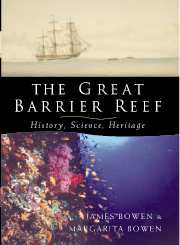Book contents
- Frontmatter
- Contents
- Abbreviations and Acronyms
- Preface
- Acknowledgments
- Introduction: An Overview
- Part One NAVIGATORS AND NATURALISTS IN THE AGE OF SAIL
- Part Two A NEW ERA IN REEF AWARENESS: FROM EARLY SCIENTIFIC INVESTIGATION TO CONSERVATION AND HERITAGE
- Chapter 11 ORIGIN AND STRUCTURE OF CORAL REEFS: FROM FORSTER TO DARWIN
- Chapter 12 DARWIN'S LEGACY: CORAL REEF CONTROVERSY 1863–1923
- Chapter 13 EXPLOITATION CHALLENGED: RISE OF ECOLOGY
- Chapter 14 REEF RESEARCH AND CONTROVERSY: 1920–1930
- Chapter 15 THE LOW ISLES EXPEDITION, 1928–1929: PLANNING AND PREPARATION
- Chapter 16 BIOLOGICAL RESEARCH OF THE LOW ISLES EXPEDITION
- Chapter 17 FROM DEPRESSION TO WAR: TOURISM, CONSERVATION AND SCIENCE, 1929–1939
- Chapter 18 THE PACIFIC WAR AND ITS AFTERMATH
- Chapter 19 A NEW PROBLEM: THE CONSERVATION CONTROVERSY, 1958–1972
- Chapter 20 CRISIS RESOLUTION: FORMATION OF AN ENVIRONMENTAL MANAGEMENT AUTHORITY
- Chapter 21 A NEW ERA: RESEARCH BASED MANAGEMENT
- Chapter 22 THE REEF UNDER PRESSURE: RESEARCH AND MANAGEMENT
- Chapter 23 THE REEF AS HERITAGE: A CHALLENGE FOR THE FUTURE
- References
- Index
Chapter 14 - REEF RESEARCH AND CONTROVERSY: 1920–1930
from Part Two - A NEW ERA IN REEF AWARENESS: FROM EARLY SCIENTIFIC INVESTIGATION TO CONSERVATION AND HERITAGE
Published online by Cambridge University Press: 22 September 2009
- Frontmatter
- Contents
- Abbreviations and Acronyms
- Preface
- Acknowledgments
- Introduction: An Overview
- Part One NAVIGATORS AND NATURALISTS IN THE AGE OF SAIL
- Part Two A NEW ERA IN REEF AWARENESS: FROM EARLY SCIENTIFIC INVESTIGATION TO CONSERVATION AND HERITAGE
- Chapter 11 ORIGIN AND STRUCTURE OF CORAL REEFS: FROM FORSTER TO DARWIN
- Chapter 12 DARWIN'S LEGACY: CORAL REEF CONTROVERSY 1863–1923
- Chapter 13 EXPLOITATION CHALLENGED: RISE OF ECOLOGY
- Chapter 14 REEF RESEARCH AND CONTROVERSY: 1920–1930
- Chapter 15 THE LOW ISLES EXPEDITION, 1928–1929: PLANNING AND PREPARATION
- Chapter 16 BIOLOGICAL RESEARCH OF THE LOW ISLES EXPEDITION
- Chapter 17 FROM DEPRESSION TO WAR: TOURISM, CONSERVATION AND SCIENCE, 1929–1939
- Chapter 18 THE PACIFIC WAR AND ITS AFTERMATH
- Chapter 19 A NEW PROBLEM: THE CONSERVATION CONTROVERSY, 1958–1972
- Chapter 20 CRISIS RESOLUTION: FORMATION OF AN ENVIRONMENTAL MANAGEMENT AUTHORITY
- Chapter 21 A NEW ERA: RESEARCH BASED MANAGEMENT
- Chapter 22 THE REEF UNDER PRESSURE: RESEARCH AND MANAGEMENT
- Chapter 23 THE REEF AS HERITAGE: A CHALLENGE FOR THE FUTURE
- References
- Index
Summary
THE PAN-PACIFIC UNION 1920
Following World War I a major new phase of Reef research occurred throughout the 1920s, stimulated by the efforts of Alexander Ford (1868–1945), a prominent newspaper publisher in Honolulu, who, in the same idealistic spirit that motivated President Wilson, dreamed of a fellowship of the Pacific nations, united in a common bond of ‘friendly and commercial contact and relationship’. To that end he worked tirelessly to create a formal organisation to further his vision, which also sought to promote Hawaii as a centre of Pacific cultural and research activity. Ford's efforts were rewarded when in 1919 the government of the Territory of Hawaii, as it then was, incorporated the Pan-Pacific Union as a trusteeship of twenty-one nation members appointed by Pacific governments with a comprehensive charter ‘to unite the races and countries in and about the Pacific in closer bonds of fellowship’. The central activity envisaged was promoting knowledge of their resources and opportunities by means of periodic conferences on a wide range of matters of common concern.
In those same years a separate movement had been initiated by William Morris Davis from Harvard University, one of the more accomplished of the foreigners invited to the British Association meeting in Adelaide and Melbourne in 1914.
- Type
- Chapter
- Information
- The Great Barrier ReefHistory, Science, Heritage, pp. 231 - 248Publisher: Cambridge University PressPrint publication year: 2002



